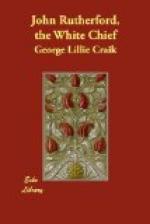The “New Zealanders” was published anonymously, and for many years the authorship was attributed to Lord Brougham. There is no doubt now, however, that the author was George Lillie Craik, a scholar and a man of letters. He was born at Kennoway, Fife, in 1798. He studied at St. Andrew’s, and went through a divinity course, but never applied to be licensed as a preacher. Like Knight, he was attracted by journalism, which he regarded as a means of instructing the public. When he was only twenty years of age he was editor of “The Star,” a local newspaper. In London he adopted authorship as a profession. In 1849, he was appointed Professor of English Literature and History at the Queen’s College, Belfast, and later on, although he still resided at Belfast, he became examiner for the Indian Civil Service. All his literary work is distinguished by careful research. Perhaps his best effort is represented by “The Pursuit of Knowledge Under Difficulties,” published in the same year as “The New Zealanders.” With a colleague he edited “The Pictorial History of England,” in four volumes. Amongst his other works are “A Romance of the Peerage,” “Spencer and his Poetry,” “A History of Commerce,” “The English of Shakespeare,” and “Bacon, his Writings and Philosophy.” He had a flowing and cultured style, and he embellished his work with many references to the classics. He was one of the best read men of his time. His extensive reading and the simplicity of his style made him a very welcome contributor to the “Penny Magazine,” the “Penny Cyclopaedia,” and other popular publications. He had a paralytic stroke while lecturing in Belfast in February, 1866, and he died in June of the same year. It is said of him that he was popular with students and welcome in society.
It is not known if Craik met Rutherford. He probably did not. He may have had “The New Zealanders” partly written when the manuscript describing Rutherford’s adventures was placed in his hands. In that case, he wove it into his book, using it as a means of illustrating his remarks on the Maoris’ customs. His work bears the stamp of honesty and industrious care. He collected all the information dealing with New Zealand available at the time, and he produced a fairly large book, which, for many years after it was published, must have been a valuable contribution to the public’s store of “entertaining knowledge.”




